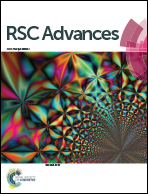Non-carbonyl Curcuma longa [NCCL] protects the heart from myocardial ischemia/reperfusion injury by reducing endothelial microparticle mediated inflammation in rats†
Abstract
Endothelial cell mediated inflammation flags and mediates the progression of pre and post myocardial infarction. The present study evaluated the effect of NCCL (a fraction of curcuma oil) in MI/RP injury. Using myocardial left coronary artery ligation and the reperfusion model, here, we show that NCCL-100 mg kg−1 possessed a better salutary effect than its parent fraction at a lower dose. Pre and post NCCL treatment in MI/RP induced rats resulted in reduced serum-CKMB and circulating levels of TNF-α, IFN-γ, IL-6 and plasma endothelial microparticle levels and improved endothelial functionality as assessed by vasoreactivity. Mechanistically, NCCL reduced the release of inflammatory mediators and endothelial microparticles from the inflamed endothelium both in vitro (10 μg mL−1) and in vivo, it also inhibited the interaction between THP-1 monocytes and endothelial cells resulting in reduced inflammation post MI/RP. Overall, our results conclude that NCCL shows a significant reduction in MI/RP rats by improving the endothelial functionality. NCCL reduced endothelial cell mediated inflammation by reducing endothelial microparticle generation.
![Graphical abstract: Non-carbonyl Curcuma longa [NCCL] protects the heart from myocardial ischemia/reperfusion injury by reducing endothelial microparticle mediated inflammation in rats](/en/Image/Get?imageInfo.ImageType=GA&imageInfo.ImageIdentifier.ManuscriptID=C6RA06858H&imageInfo.ImageIdentifier.Year=2016)

 Please wait while we load your content...
Please wait while we load your content...